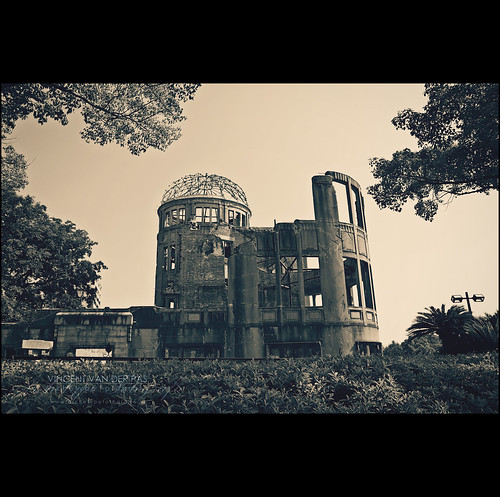Photo courtesy of Vincent_AF Flickr page - The Atomic Bomb Dome, Hiroshima: https://www.flickr.com/photos/archetypefotografie/5025409016/in/photolist-8E5x23-nVJ5qm-8M7LnA-oddKfv-avvW7Q-bmEKtu-2vyuvc-8M7MFG-8M7PmL-8M7NMy-8M4K5n-8M4Jba-8M7N3Y-8M4KBK-8M4LdR-8M4KMc-8M4JAP-avwmsJ-8M4Kx8-nSquUT-qNbtVe-vsmG7B-vhv8Mg-dZzNcS-8M4FGM-dKhfhK-8WLrSX-2tcJCb-acfhQa-oKvSfE-2tfSsG-k41K4k-8M7Jjd-8WPt8S-ovCAu7-c6cZCG-okUeuz-o1Bxes-uuq7VM-nGtFbc-2tfozY-aJzE6T-9wDUom-aaSJB3-9vLEvB-9VcxSa-87XyBt-vs7KsY-9vifws-nAyixi
Creative Commons License: https://creativecommons.org/licenses/by-sa/2.0/
It was seventy years ago today that the United States, under the direction of President Harry Truman, dropped the atomic bomb on Hiroshima.
We all know that this was a weapon like no other.
And while there were actually more people killed in other attacks on cities through the method of firebombing, this particular attack stands out because it forced us to enter into a new era, with the threat of nuclear war now a distinct possibility.
Of course, people argue about the merits, or the lack thereof possibly, behind the decision to drop the bomb.
Those who defend it will say that it saved the lives of likely tens of thousands of Americans, who would have had to otherwise endure a long and bitter invasion of Japan itself. Others may not defend the dropping of the bomb itself, but point instead to the crimes that the Japanese committed during the war, including the horrors that they were responsible for in territories that they took over and occupied, such as the infamous incident known as the Rape of Nanking.
Others, of course, suggest that the United States overstepped a boundary in dropping this bomb. Some have argued racism, since the bomb was dropped on the Japanese. Some will argue that Americans, and Westerners more generally, never have come to accept that this was a massacre, and quite possibly a crime against humanity. Still others might point out that the use of the bomb by the United States made the Soviets fearful, and that they redoubled their own efforts to obtain this technology, so that they could have more leverage and not be pushed around by the United States, and that this eventually escalated into the Cold War.
Whatever the truth, the horror of this incident lives with us all still to this day, even after seven decades have passed. This was one of those moments - and there were many during World War II - from which nothing really ever fully returned back to normal.
Most of us have seen images of the city itself after the detonation. It was leveled, and what remained standing was clearly damaged.
However, there are other photographs that were banned from being shown in the United States. These show what the bomb did to the Japanese people in Hiroshima. They show horrors, such as the skin of people hanging off of their bodies. Truly gruesome stuff.
As an American myself, I accept that this bombing was a devastating horror. If it was necessary (and I am not sure that it was, although I do understand the logic and desire to end the war earlier than would otherwise have been possible), then we also need to understand that whether or not they have accepted this yet, Americans nonetheless bear a certain responsibility as a people for unleashing this horror on the world. The United States remains the only nation with the dubious distinction of having dropped the bomb on another nation.
Let us hope that this remains the case. Let us also hope that both sides come to accept the horrors that they were responsible for during the war. It seems that Germany has accepted much of the responsibility that it can be blamed for, and have rejected militarism and hatred. Italy also has accepted their role, although not as fully as Germany has. France has come to accept the dubious role that the collaborators and the Vichy government play, although more discussion and understanding is needed. But Japan still seems reluctant to accept responsibility for the crimes that it committed. For that matter, the victorious Allied nations have not come to terms with the devastating firebombings on civilians cities such as Dresden and Tokyo, let alone the atomic bomb being dropped on Hiroshima and Nagasaki.
The victorious Allies were joyous, and the streets were filled with jubilation once Japan surrendered, and the war ended. That is entirely understandable, although it should not have been the only reaction, this happiness that the war had finally ended.
There should be a sadness over the unprecedented horrors seen and experienced during World War II. It should have gone much, much further towards achieving a greater and lasting understanding between peoples of the world, and a strong desire for peace.
Instead, we see the war deteriorating at an ever quicker pace, with only too many nations and leaders once again pining for war, which is supposed to be a last option, but is too often the first option.
Hiroshima, if it is remembered for anything, should be a testament to just how quickly and permanently tensions can escalate once they are unleashed. Tens of thousands of people were killed, and many, many more suffered serious and gruesome injuries. Those that survived remained haunted for the rest of their lives, and that includes those who have survived to this day.
So today, I take a moment to acknowledge this solemn anniversary, and remember what happened. To reflect on the folly of war and tragedy of this event, and of war in general.
If anything positive truly came out of dropping the bomb, let it not be just the celebrations of the end of World War II, but also the understanding that we cannot play the war game with the same lightness that leaders in the past entered into it. It should always be the final option, and we should understand the impact of our actions, and not simply accept these being censored by our governments.
Today, I remember the bomb dropping on Hiroshima 70 years ago on this day.

No comments:
Post a Comment